Effects of probiotic type, dose and treatment duration on irritable bowel syndrome diagnosed by Rome III criteria: a meta-analysis
- PMID: 27296254
- PMCID: PMC4907258
- DOI: 10.1186/s12876-016-0470-z
Effects of probiotic type, dose and treatment duration on irritable bowel syndrome diagnosed by Rome III criteria: a meta-analysis
Abstract
Background: Irritable bowel syndrome (IBS) is one of the most common functional gastroenterological diseases, affecting 11.2 % of people worldwide. Previous studies have shown that probiotic treatment may benefit IBS patients. However, the effect of probiotics and the appropriate type, dose, and treatment duration for IBS are still unclear. The aim of the current study was to assess the efficacy of different probiotic types, doses and treatment durations in IBS patients diagnosed by Rome III criteria via a meta-analysis of randomized controlled trials (RCTs).
Methods: Medline, EMBASE, and the Cochrane Central Register of Controlled Trials up to October 2015 were searched. RCTs including comparisons between the effects of probiotics and placebo on IBS patients diagnosed by Rome III criteria were eligible. Dichotomous data were pooled to obtain the relative risk (RR) with a 95 % confidence interval (CI), whereas continuous data were pooled using a standardized mean difference (SMD) with a 95 % CI.
Results: Twenty-one RCTs were included in this meta-analysis. Probiotic therapy was associated with more improvement than placebo administration in overall symptom response (RR: 1.82, 95 % CI 1.27 to 2.60) and quality of life (QoL) (SMD: 0.29, 95 % CI 0.08 to 0.50), but not in individual IBS symptoms. Single probiotics, a low dose, and a short treatment duration were more effective with respect to overall symptom response and QoL. No differences were detected in individual IBS symptoms in the subgroup analyses.
Conclusion: Probiotics are an effective pharmacological therapy in IBS patients. Single probiotics at a low dose and with a short treatment duration appear to be more effective in improving overall symptom response and QoL, but more evidence for these effects is still needed.
Keywords: Irritable bowel syndrome; Meta-analysis; Probiotics.
Figures
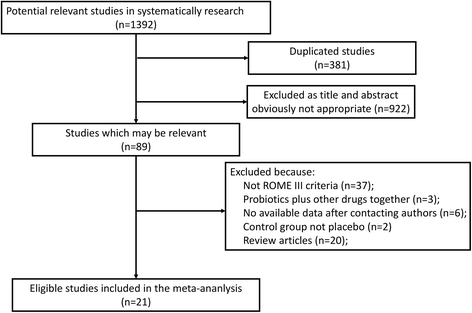
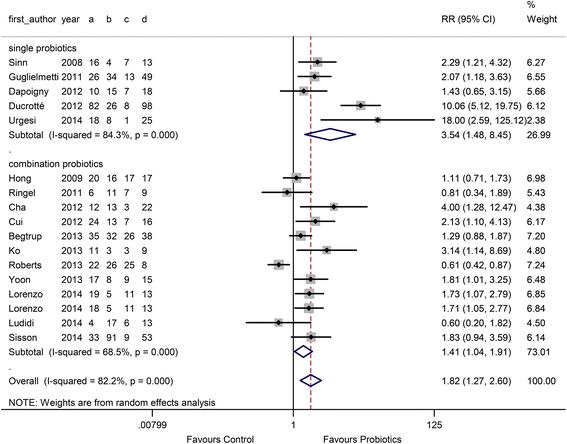
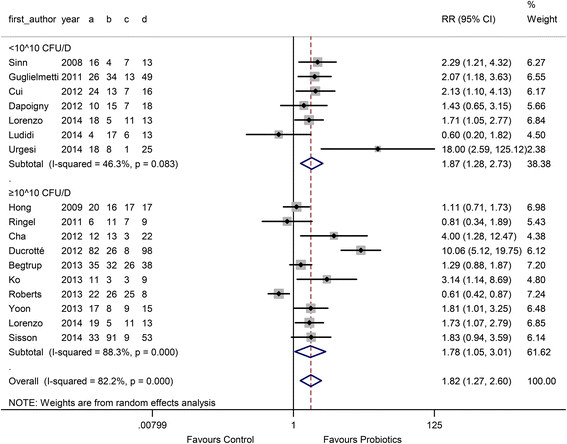
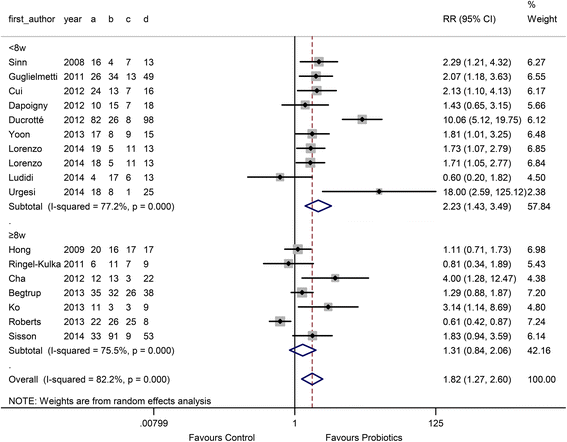
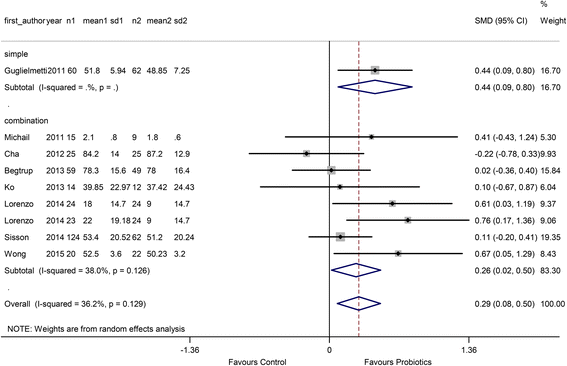
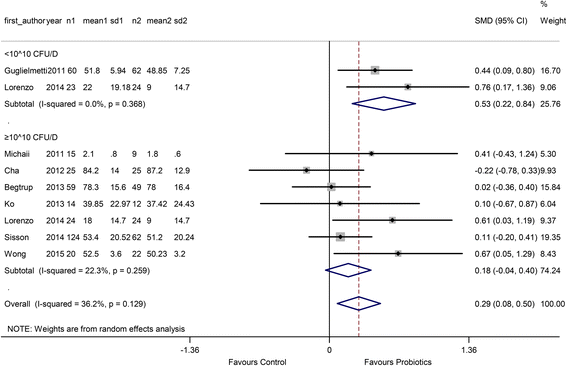
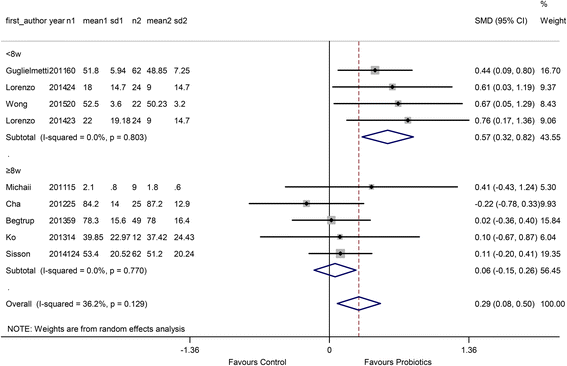
Similar articles
-
Efficacy and safety of probiotics in the treatment of irritable bowel syndrome: A systematic review and meta-analysis of randomised clinical trials using ROME IV criteria.Clin Nutr. 2023 May;42(5):800-809. doi: 10.1016/j.clnu.2023.03.019. Epub 2023 Mar 31. Clin Nutr. 2023. PMID: 37031468
-
Effectiveness of probiotics in irritable bowel syndrome: Updated systematic review with meta-analysis.World J Gastroenterol. 2015 Mar 14;21(10):3072-84. doi: 10.3748/wjg.v21.i10.3072. World J Gastroenterol. 2015. PMID: 25780308 Free PMC article. Review.
-
Efficacy of Bifidobacterium infantis 35624 in patients with irritable bowel syndrome: a meta-analysis.Curr Med Res Opin. 2017 Jul;33(7):1191-1197. doi: 10.1080/03007995.2017.1292230. Epub 2017 Mar 7. Curr Med Res Opin. 2017. PMID: 28166427 Review.
-
Efficacy of Probiotics for Irritable Bowel Syndrome: A Systematic Review and Network Meta-Analysis.Front Cell Infect Microbiol. 2022 Apr 1;12:859967. doi: 10.3389/fcimb.2022.859967. eCollection 2022. Front Cell Infect Microbiol. 2022. PMID: 35433498 Free PMC article. Review.
-
Probiotics for management of functional abdominal pain disorders in children.Cochrane Database Syst Rev. 2023 Feb 17;2(2):CD012849. doi: 10.1002/14651858.CD012849.pub2. Cochrane Database Syst Rev. 2023. PMID: 36799531 Free PMC article. Review.
Cited by
-
Dietary geraniol ameliorates intestinal dysbiosis and relieves symptoms in irritable bowel syndrome patients: a pilot study.BMC Complement Altern Med. 2018 Dec 19;18(1):338. doi: 10.1186/s12906-018-2403-6. BMC Complement Altern Med. 2018. PMID: 30567535 Free PMC article. Clinical Trial.
-
Interactions between the Gut Microbiome, Lung Conditions, and Coronary Heart Disease and How Probiotics Affect These.Int J Mol Sci. 2021 Sep 8;22(18):9700. doi: 10.3390/ijms22189700. Int J Mol Sci. 2021. PMID: 34575864 Free PMC article. Review.
-
Microbiota in Irritable Bowel Syndrome and Endometriosis: Birds of a Feather Flock Together-A Review.Microorganisms. 2023 Aug 15;11(8):2089. doi: 10.3390/microorganisms11082089. Microorganisms. 2023. PMID: 37630649 Free PMC article. Review.
-
Evaluation of potentially probiotic attributes of certain dairy yeast isolated from buffalo sweetened Karish cheese.Heliyon. 2019 May 14;5(5):e01649. doi: 10.1016/j.heliyon.2019.e01649. eCollection 2019 May. Heliyon. 2019. PMID: 31193166 Free PMC article.
-
Anti-tumor activities of probiotics in cervical cancer.J Ovarian Res. 2020 Jun 11;13(1):68. doi: 10.1186/s13048-020-00668-x. J Ovarian Res. 2020. PMID: 32527332 Free PMC article. Review.
References
-
- Lovell RM, Ford AC. Global prevalence of and risk factors for irritable bowel syndrome: a meta-analysis. Clinical gastroenterology and hepatology : the official clinical practice. J Am Gastroenterol Assoc. 2012;10(7):712–21. - PubMed
-
- Longstreth GF, Thompson WG, Chey WD, Houghton LA, Mearin F, Spiller RC. Functional bowel disorders. Gastroenterology. 2006;130(5):1480-1491. - PubMed
Publication types
MeSH terms
Substances
LinkOut - more resources
Full Text Sources
Other Literature Sources

